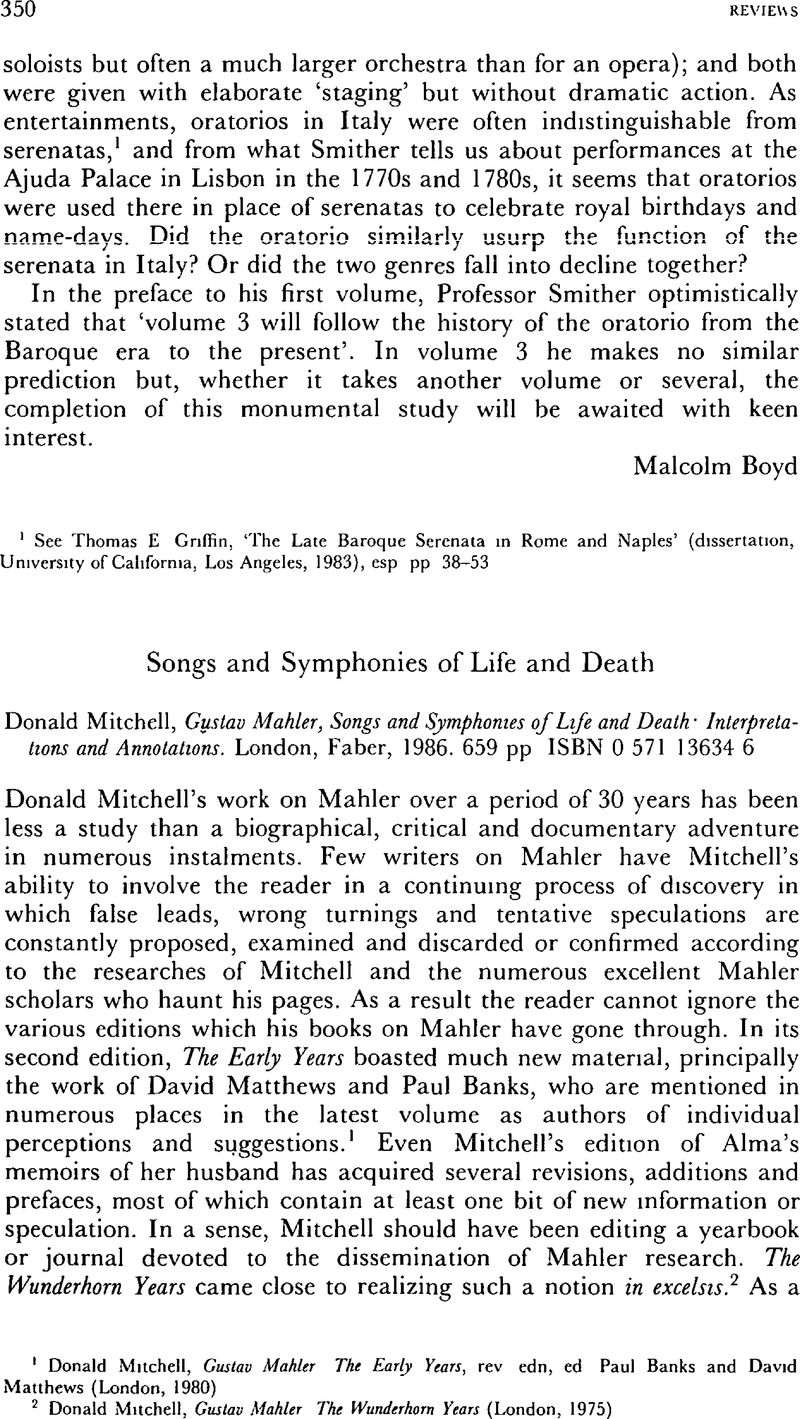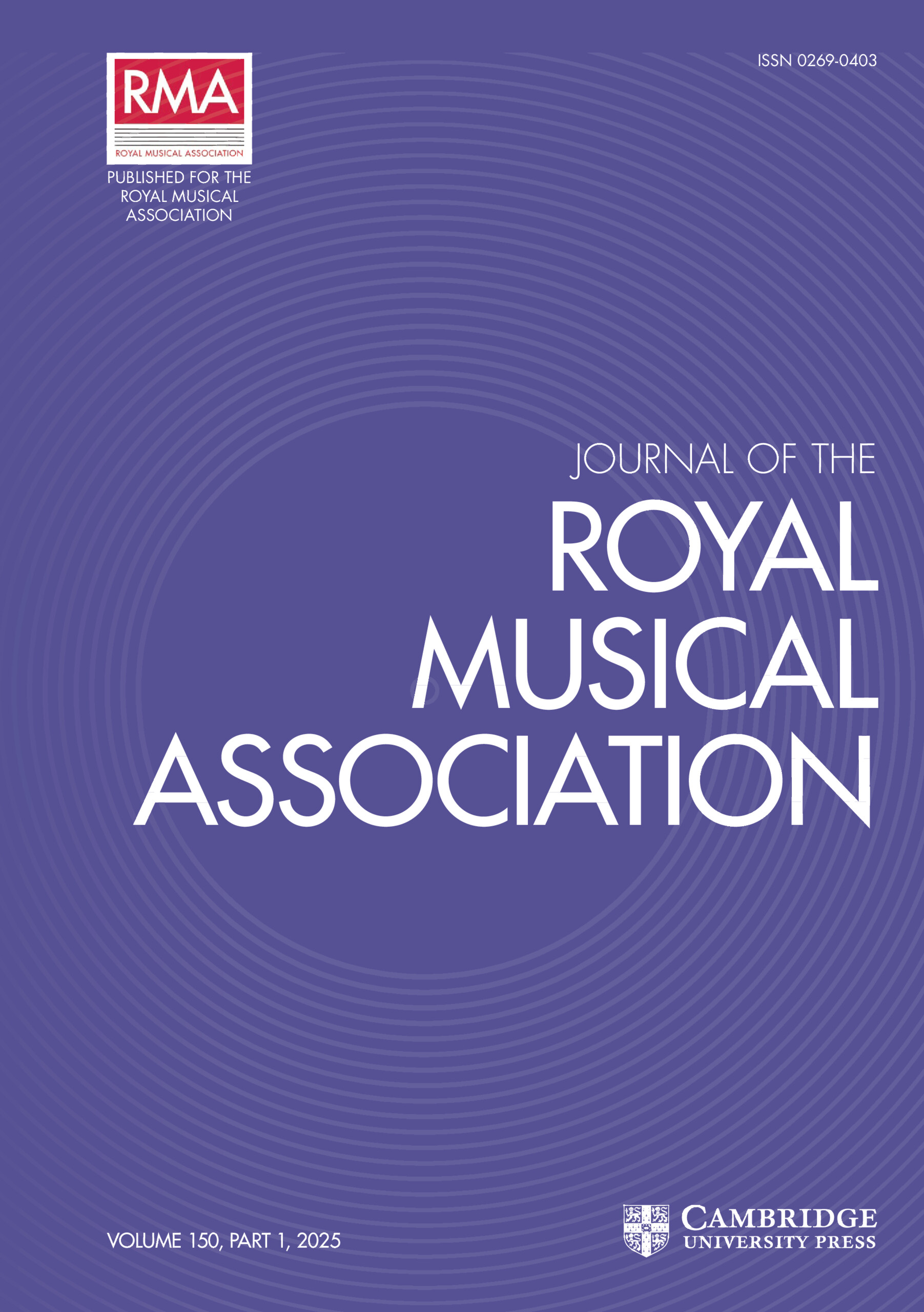No CrossRef data available.
Article contents
Songs and Symphonies of Life and Death - Donald Mitchell, Gustav Mahler, Songs and Symphonies of Life and Death Interpretations and Annotations. London, Faber, 1986. 659 pp ISBN 0 571 13634 6
Published online by Cambridge University Press: 01 January 2020
Abstract

- Type
- Review Article
- Information
- Copyright
- Copyright © 1988 Royal Musical Association
References
1 Mitchell, Donald, Gustav Mahler The Early Years, rev edn, ed Paul Banks and David Matthews (London, 1980)Google Scholar
2 Mitchell, Donald, Gustav Mahler The Wunderhorn Years (London, 1975)Google Scholar
3 Henry-Louis de La Grange, Gustav Mahler Chronique d'une vie, 3 vols. (Paris, 1979–84)Google Scholar
4 Mitchell, Donald, ‘Mahler's “Abschied” A Wrong Note Righted’, The Musical Quarterly, 71 (1985), 200–4Google Scholar
5 See also the remarks by Michael Kennedy in his review of the present volume, The Musical Times, 127 (1986), 153CrossRefGoogle Scholar
6 See, for example, ‘Mahler and Freud’, in Gustav Mahler The Wunderhom Years, 70–8Google Scholar
7 Mahler's Weltanschauung has been exhaustively considered in another major work recently completed Constantin Floros, Gustav Mahler, 3 vols (Wiesbaden, 1977–85)Google Scholar
8 See, for example, Mayer, Hans, ‘Musik und Literatur’, in Gustav Mahler (Tubingen, 1966), 142–56, Wenk, Arthur, ‘The Composer as Poet in Das Lied von der Erde’, Das Lied von der Erde 1 (1977), 33–47, Susanne Vill, Vermittlungsformen verbalmerter und musikalischer Inhalte in der Musik Gustav Mahlers (Tutzing, 1979)Google Scholar
9 Agawu, V Kofi, ‘The Musical Language of Kindertotenlieder No 2’, Journal of Musicology, 2 (1983), 81–93, Allen Forte, ‘Middleground Motives in the Adagietto of Mahler's Fifth Symphony’, 19th Century Music, 8 (1984), 153–63, John Williamson, ‘The Structural Premises of Mahler's Introductions Prolegomena to an Analysis of the First Movement of the Seventh Symphony’, Music Analysis, 5 (1986), 29–57Google Scholar
10 Tischler, Hans, ‘Mahler's Impact on the Crisis of Tonality’, Music Review, 12 (1951), 113–21Google Scholar
11 Fritz Egon Pamer, ‘Gustav Mahlers Lieder’, Studien zur Musikwissenschaft, 16 (1929), 135Google Scholar
12 Lorenz, Alfred, Das Geheimnis der Form bei Richard Wagner, 4 vols (2nd edn, Tutzing, 1966),1, 107–8, the substance of Lorenz's remarks here and elsewhere is that the layout of a Reprisenbar will resemble a sonata form with repeated exposition if the Stollen have more than one theme If there is no exposition repeat (‘modern sonata form’, according to Lorenz), then sonata form resembles Bogenform (see, for example, iii, 186)Google Scholar
13 Adorno, Theodor Wiesengrund, Mahler Eine musikalische Physiognomik (Frankfurt, 1962), 60–1Google Scholar
14 Newlin, Dika, Bruckner–Mahler–Schoenberg (New York, 1947), 192–4, Hans Redlich, Bruckner and Mahler (rev edn, London, 1963), 216.Google Scholar
15 Williamson, John, ‘Mahler and Vem Creator Spiritus’, Vem Creator Spiritus 44 (1983), 25–35Google Scholar
16 Gustav Mahler Unbekannte Briefe, ed. Herta Blaukopf (Vienna and Hamburg, 1983), 47–59 (esp p 52)Google Scholar
17 Gustav Mahler Briefe, ed Herta Blaukopf (Vienna and Hamburg, 1982), 248Google Scholar
18 Selected Letters of Gustav Mahler, trans Eithne Wilkins and Ernst Kaiser (with Bill Hopkins), ed Knud Mariner (London, 1979), 242Google Scholar
19 Blaukopf, Kurt, Gustav Mahler A Documentary Study, trans Paul Baker et al (London, 1976), 224Google Scholar
20 Gustav Mahler. Samtliche Werke, viii Symphonie Nr 8, ed Karl Heinz Füssl (Vienna, 1977), Foreword.Google Scholar
21 Mahler Unbekannte Briefe, 55Google Scholar
22 See David B Greene, Mahler Consciousness and Temporality (New York, 1984), 199Google Scholar
23 Grange, La, Gustav Mahler, iii, 1079Google Scholar
24 Floras, Gustav Mahler, ii, 311–17Google Scholar
25 Mahler, Alma, Gustav Mahler Memories and Letters, trans Basil Creighton, ed Donald Mitchell (3rd edn, London, 1973), 42Google Scholar
26 Floras, Gustav Mahler, iii, 133, 147Google Scholar
27 Grange, La, Gustav Mahler, ii, 1120; this should be compared with La Grange, Mahler (London, 1973), 632, 941, for Mahler's plans for the symphony at an early stage, see Natalie Bauer-Lechner, Recollections of Gustav Mahler, trans Dika Newlin, ed Peter Franklin (London, 1980), 173Google Scholar


